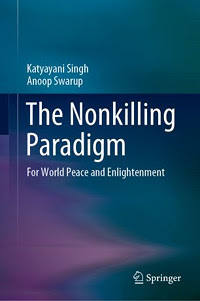Nonkilling Paradigm
REVIEWS, 13 Jan 2020
Joám Evans Pim | Center for Global Nonkilling – TRANSCEND Media Service
21 Dec 2019 – Springer academic publishers has just released The Nonkilling Paradigm: For World Peace and Enlightenment by Dr. Katyayani Singh and Dr. Anoop Swarup, Chair of the Center for Global Nonkilling.
 This new contribution to the development of nonkilling theory emerged from a doctoral dissertation entitled Nonkilling and Global Peace: A Study of Emerging Paradigms and Prospects, that was defended by Katyayani Singh in November 2018 at Lakecity University, Bhopal, India, under the guidance of Dr. Swarup.
This new contribution to the development of nonkilling theory emerged from a doctoral dissertation entitled Nonkilling and Global Peace: A Study of Emerging Paradigms and Prospects, that was defended by Katyayani Singh in November 2018 at Lakecity University, Bhopal, India, under the guidance of Dr. Swarup.
The book addresses the human civilizational ethos and explores the concept of the nonkilling paradigm concerning human dignity, human rights, affirmative nonkilling, positive peace and the advancement of human existence. It focuses on the complex question of how to mitigate the prevalent lethal actions and lay out a roadmap for a large-scale transformation of global society into a nonkilling one.
It examines the lives of charismatic socio-political leaders who have played a vital role in achieving revolutions in their respective contexts and societies, and studies these revolutions from a nonkilling perspective, investigating the number of human lives lost, both during and after the revolution, due to deliberate actions on the part of leaders. In closing, it assesses the global status quo and current trends and presents a Global Nonkilling Index to record deliberate killings around the world.
The book is a significant addition to the literature, specifically in the field of reinterpreting Gandhian concepts in the light of contemporary needs. Given its scope, the book is of immense value to researchers and practitioners in the areas of political science, philosophy, sociology & peace studies. Moreover, it is a must-read for everyone interested in promoting global nonviolence, nonkilling & peace.
_____________________________________________
Joam Evans Pim is director of the Center for Global Nonkilling and a member of the TRANSCEND Network.
Go to Original – nonkilling.org
Tags: Nonkilling, Reviews
DISCLAIMER: The statements, views and opinions expressed in pieces republished here are solely those of the authors and do not necessarily represent those of TMS. In accordance with title 17 U.S.C. section 107, this material is distributed without profit to those who have expressed a prior interest in receiving the included information for research and educational purposes. TMS has no affiliation whatsoever with the originator of this article nor is TMS endorsed or sponsored by the originator. “GO TO ORIGINAL” links are provided as a convenience to our readers and allow for verification of authenticity. However, as originating pages are often updated by their originating host sites, the versions posted may not match the versions our readers view when clicking the “GO TO ORIGINAL” links. This site contains copyrighted material the use of which has not always been specifically authorized by the copyright owner. We are making such material available in our efforts to advance understanding of environmental, political, human rights, economic, democracy, scientific, and social justice issues, etc. We believe this constitutes a ‘fair use’ of any such copyrighted material as provided for in section 107 of the US Copyright Law. In accordance with Title 17 U.S.C. Section 107, the material on this site is distributed without profit to those who have expressed a prior interest in receiving the included information for research and educational purposes. For more information go to: http://www.law.cornell.edu/uscode/17/107.shtml. If you wish to use copyrighted material from this site for purposes of your own that go beyond ‘fair use’, you must obtain permission from the copyright owner.

Dear Dr Evans Pim,
thank you for this important book review, a welcome addition to the nonkilling literature.
Large-scale deliberate killing of members of one’s own species is typical of human beings, yes, but a very recent and only cultural acquisition (about 5.000 years ago, 200.000 years after Homo sapiens appearance). It will be necessary to find an explanation for this strange non-adaptive cultural evolution. not just mitigating such aberrant behaviour. The idea of unavoidable violence is still prevalent in the public and among academics.
In the meanwhile any reporting and analysis of killing and ethical alternatives toward nonkilling are very useful.
Piero P. Giorgi (National Centre for Peace, Otago University, Dunedin, NZ)